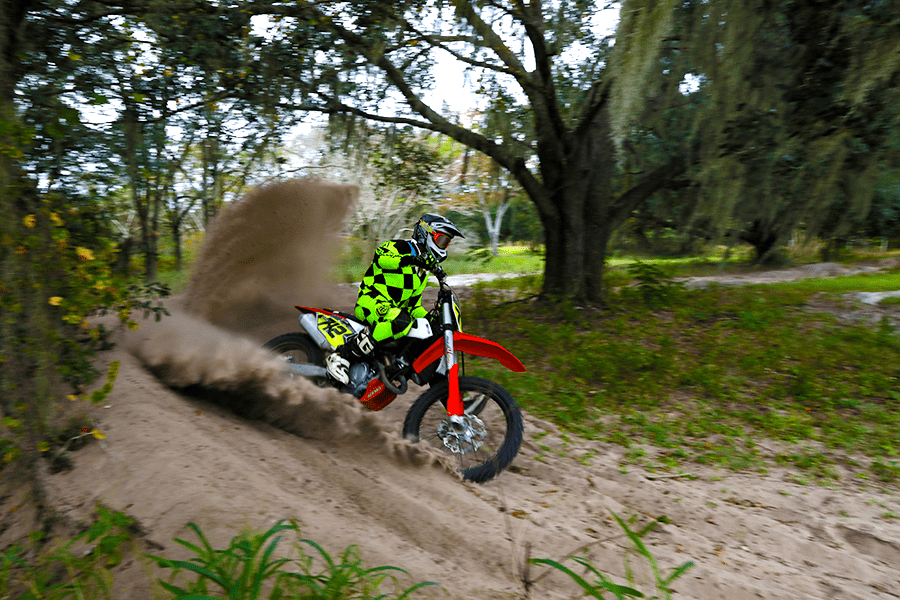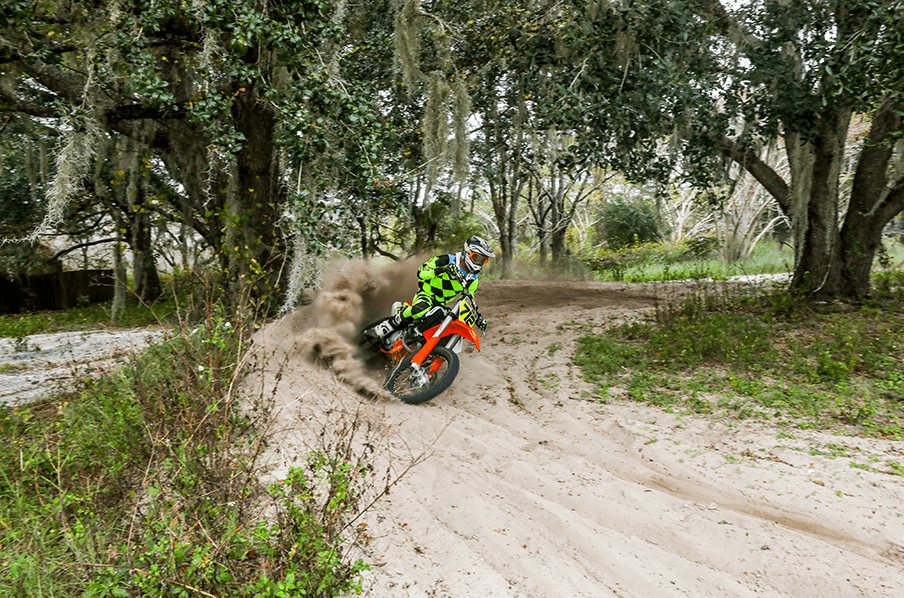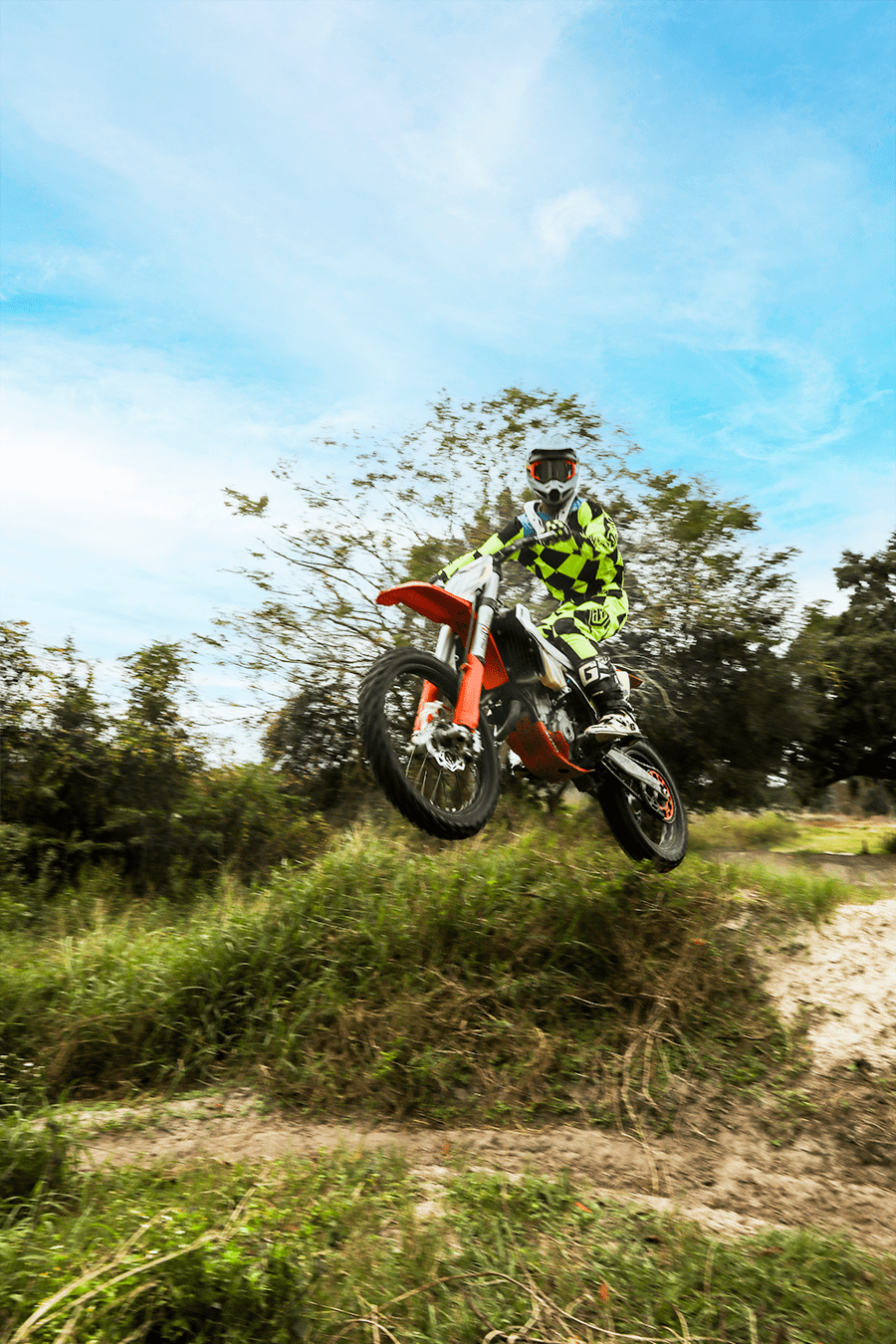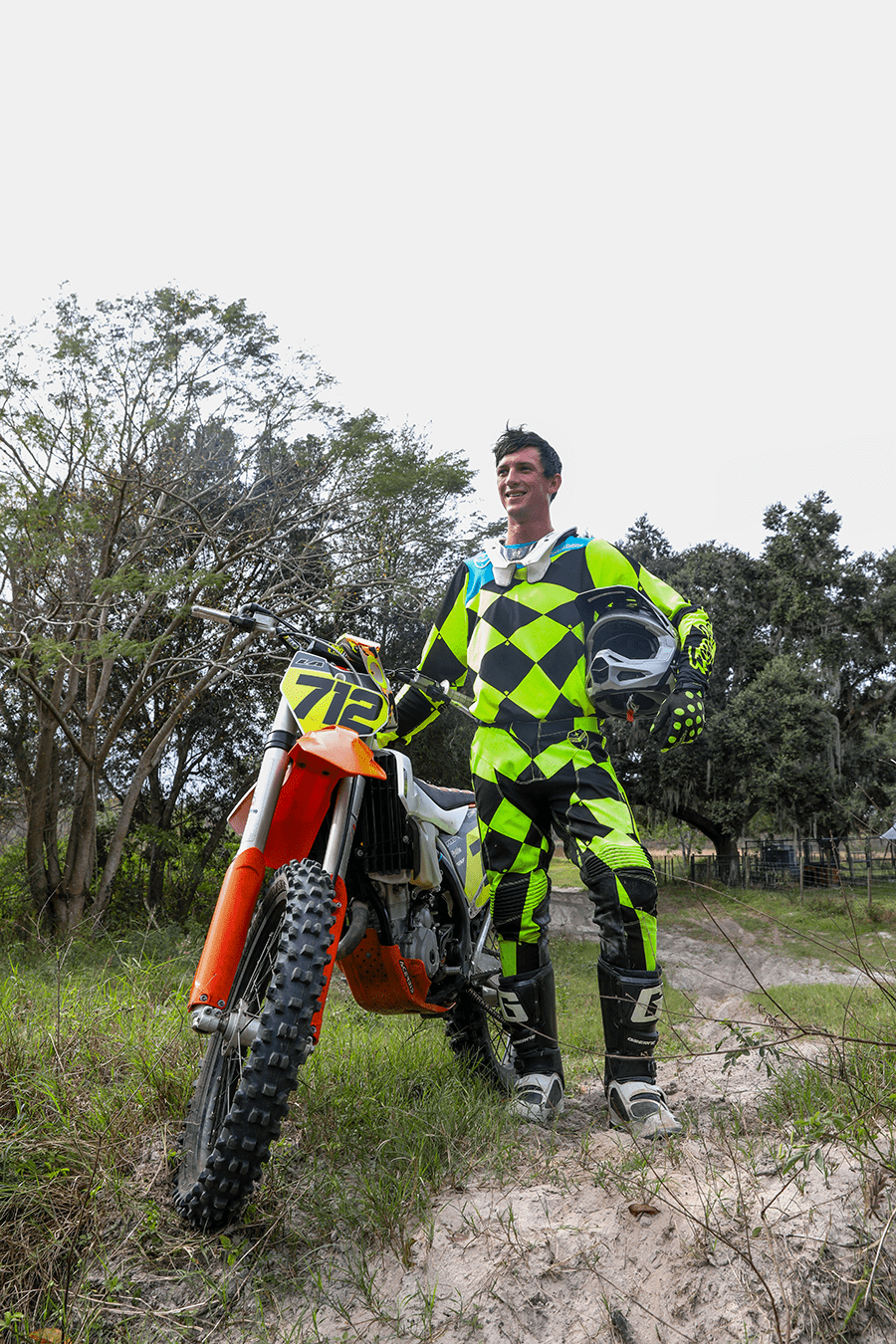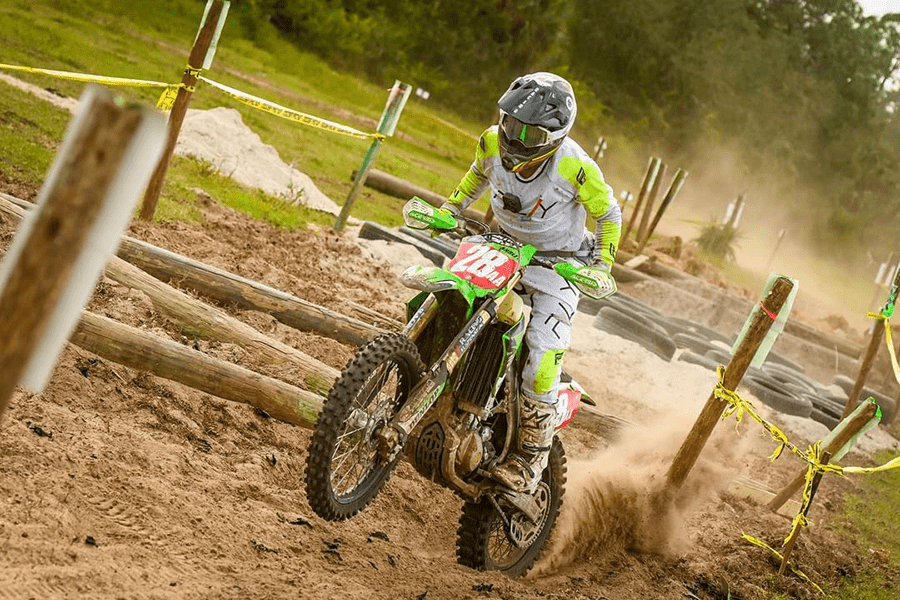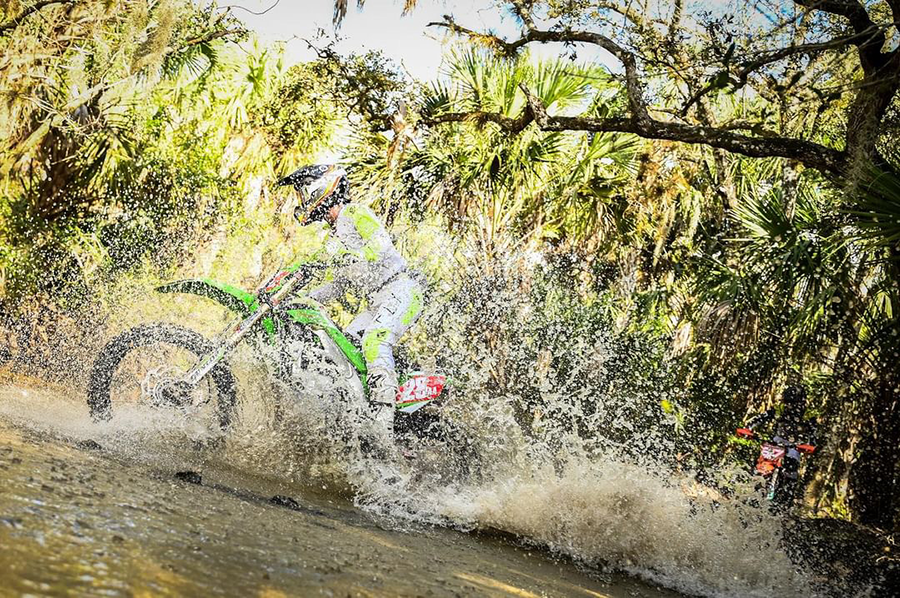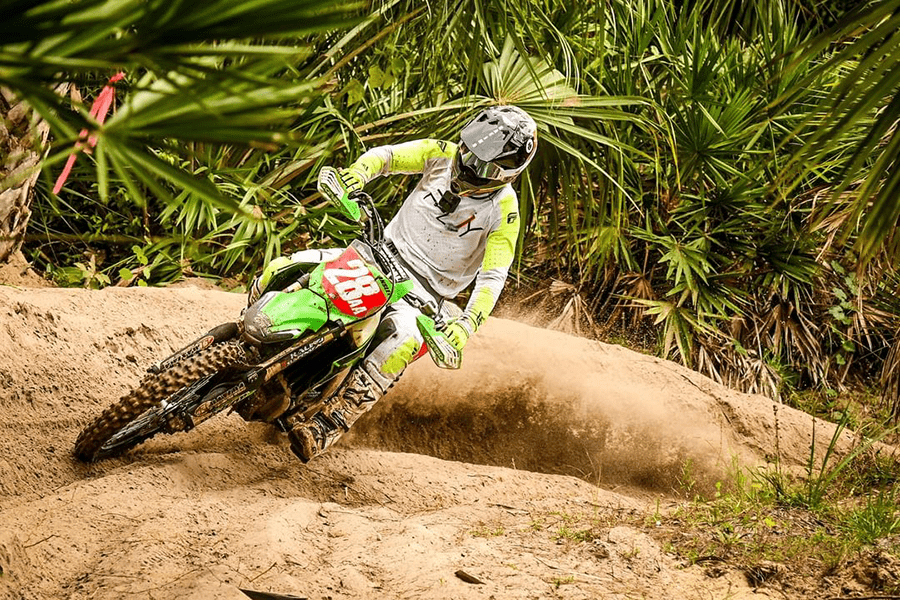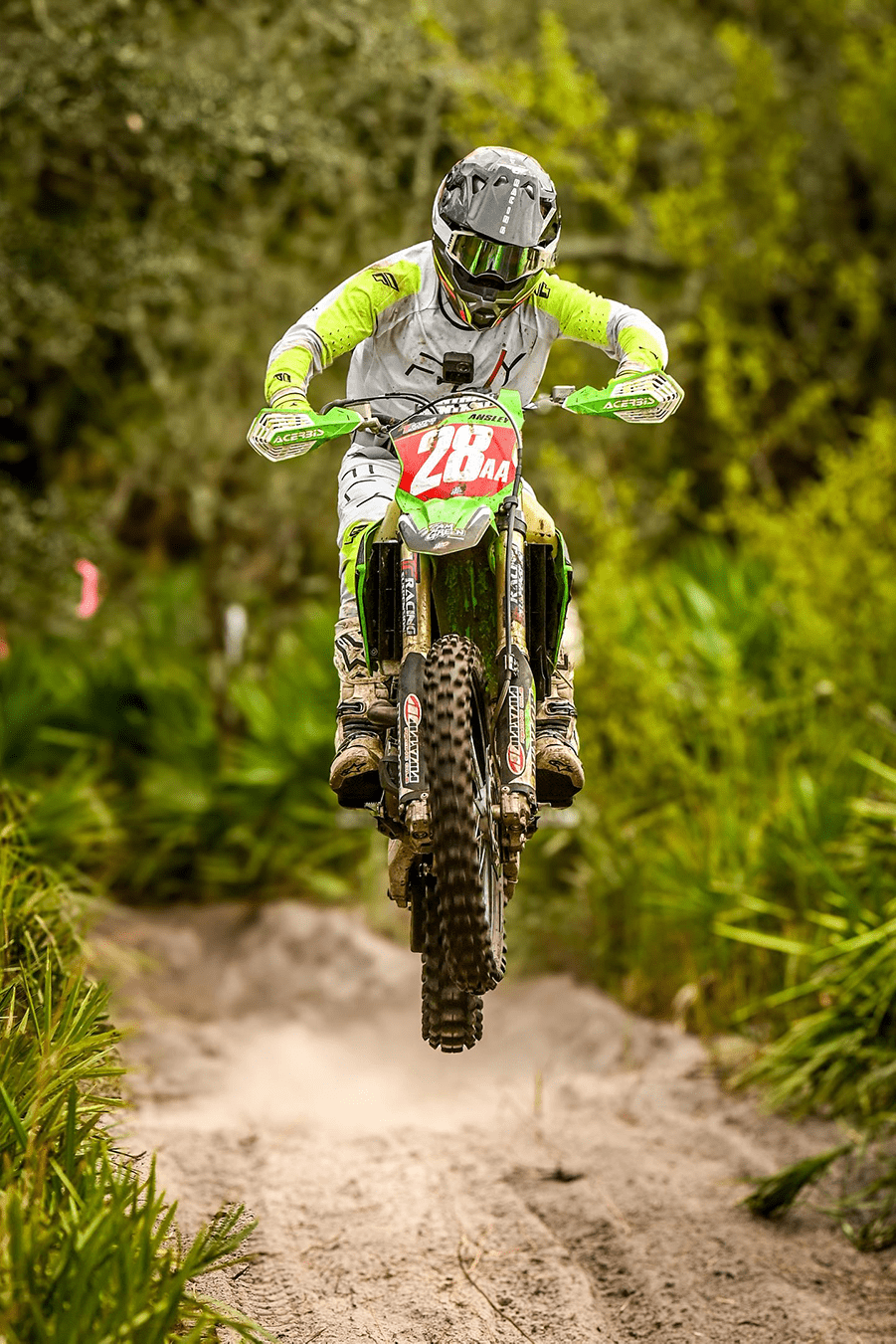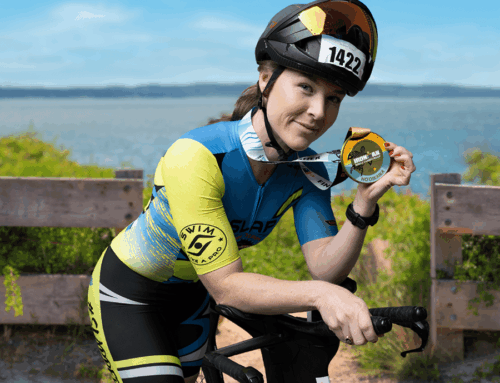
By Roxanne Brown
Unmasking the Rush, Risks and Resilience Behind Motocross Racing

Unmasking the rush, risks and resilience behind the high-octane universe of motocross racing.
Some people live each day as grounded as possible, a mindset that may translate to taking the safest route in every instance, no matter the activity.
Others live for a thrill and seek out excitement, speed and danger at every turn.
Leesburg’s own Logan Anderson will tell you that he belongs to the latter group. Still, he might argue that despite his love for motorcycles and his thrill-seeking nature, he’s extremely grounded . . . although his definition of the word might involve occasionally being thrown onto or hitting the ground.
“I’ve been into motocross for 24 years. I’ve been racing since I was 5,” says Logan, now 29. “My grandfather got me into it. He got his first motorcycle when he was about 30, so I grew up around it. I was just kind of born into it, luckily.”
What is Motocross?
Motocross is a racing sport that involves riders maneuvering a motorcycle or dirt bike over rough terrain. While dirt bike racing is through trails, motocross races take place on 1 to 3-mile dirt tracks filled with hills, bumps, sharp turns and obstacles. Mix those obstacles with full throttle speeds and many times competitors are literally sent flying into exhilarating high jumps, spins, tricks, spills and crashes—all part of the allure for spectators.
The point of a race is to see who can successfully navigate a course the fastest.
The sport takes focus, mental fortitude, quick-thinking and resilience, especially when it comes to getting up and back on the bike after inevitable falls. Most of all, it requires proper training and preparation because motocross has a lot to do with riding position, weight distribution, strength and proper form.
But the rewards are well worth the risks and hard work. Just ask any rider.
“You’re so focused on what’s ahead of you while you’re on the bike that whatever is going on in your life is lost in the moment, it’s kind of an escape,” Logan says. “You’re out there with your own thoughts, so you can be as creative as you want, and like a pilot, there’s an adrenaline rush that goes along with that feeling of being in the air and flying.”
Pro rider Zach Osborne agrees.
“When you’re on that track, it’s like finding a different kind of freedom. The motorcycle becomes an extension of you, and every turn, every jump is like a dance. The adrenaline, the focus, and that connection is addictive—it’s what drives us in this sport,” Zach says.
Zach, surrounded by motorcycles and four-wheelers on his family’s Virginia farm, began riding at age 6. Starting with casual rides around the fields, he transitioned into local fairground races, gradually progressing to bigger races and national championships.
In 2016, Zach moved to Florida to train at Center Hill’s Baker’s Factory, a specialized motocross and supercross training facility run by Aldon Baker in Sumter County. Following his retirement in 2021, Zach and his family settled in Clermont and built a home.
Zach’s career highlights include clinching multiple titles in both motocross and supercross, most notably the 2020 450 Pro Motocross Championship and two 250 supercross titles. His first career championship came at the 2017 Las Vegas Supercross.
Logan Anderson
More than just racing
Central Florida, including Lake and Sumter Counties, serves as a training hub for racers, where tracks in Orlando, Groveland, Wildwood, and Bushnell offer not just a place to race but a sanctuary for shared passions and growth.
Logan says many motocross enthusiasts from other parts of the country end up in Florida because good weather conditions and mild winters make the Sunshine State a year-round training ground.
Logan says most of the time, families travel together to root for and help their riders. Family passion is common in the tight-knit racing community.
“Many racers know each other and many started racing as young kids because of their families,” adds Logan, who works and has a family, but continues to ride whenever possible, as does his grandfather.
Kyle Turnis, owner of MOTO4PLAY LLC in Clermont, specializes in servicing and repairing bikes, keeping them in top shape for performance purposes, but also, to keep riders safe. He says there is a network of mechanics, trainers, and professionals dedicated to nurturing talent and helping riders pursue their goals.
“We have a nice hub here in Lake County and a lot of big-name pros train and live in Clermont,” Kyle says. “They travel all over the world on weekends, but then Monday morning, they’re back at the gym or on the track training and getting ready for the next event.”
Kyle, still passionate about riding and enjoying the rush, says he loves knowing that the work he’s been doing for the past 10 years makes a difference for today’s racers.
He also reflects on the industry’s growth, noting the surge in popularity during the COVID-19 period when outdoor activities became more sought after. Since then, he’s observed an influx of new riders and enthusiasts in the motocross community.
Safety remains a paramount concern for Kyle and his team, who meticulously double and triple check mechanical elements to minimize failures that could pose risks to riders. He stresses the importance of prioritizing safety over victories, advocating for a secure environment for riders and mechanics alike, since they often travel to races together.
Along those same lines, trainers play an integral role in riders’ lives and careers. Cue Jason Baker, who with his wife Stacey, founded Moto Sandbox, a semi-private training facility in the Groveland/Mascotte area.
Jason says the facility blends top-tier training, safety, and community support. It offers programs and camps for pro riders at the top of their game looking to keep in shape mentally and physically, amateur riders looking to go pro and new riders (as young as 4) with a desire to learn about the sport and grow into racing.
Jason knows his stuff too. He’s been riding since he was a young kid, plus he owns Dream Traxx, a company that builds moto tracks for professional riders and training facilities worldwide.
“It’s all about having fun on your dirt bike, but we’re gonna teach you how to have fun safely,” Jason says.
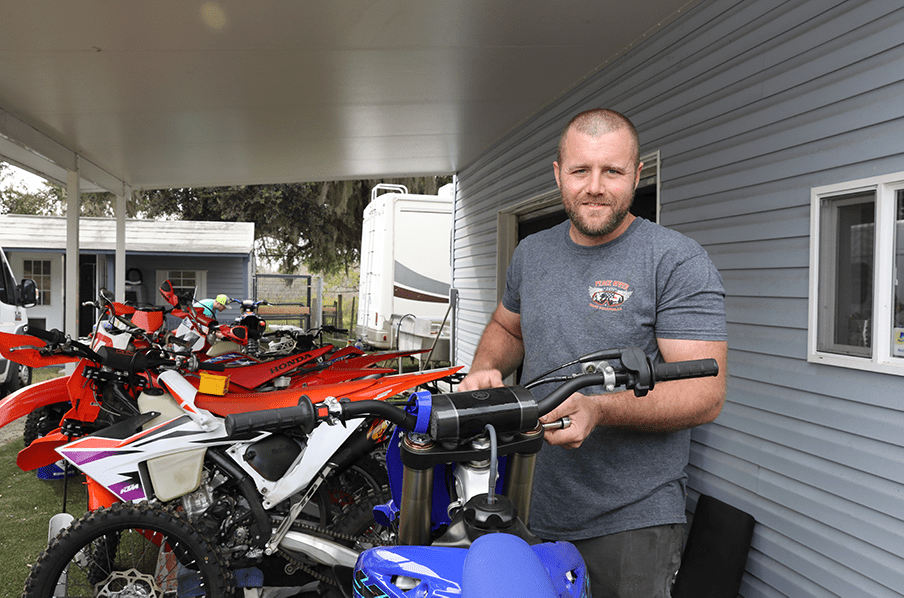
Kyle Turnis
Dangers
Zach says that motocross is exhilarating, but he acknowledges its dangers after experiencing about 20 broken bones and various injuries throughout his career.
Logan has also suffered many injuries, including a broken elbow and a knee reconstruction. He says paralysis (or worse) is the biggest fear among riders.
On a positive note, Logan has developed mental resilience. The sport teaches riders not to give up, to persevere through mental battles and know your limits. Logan admits how being away from the sport during recovery feels like missing an essential part of life.
Zach advises young riders to seek guidance from their trainers and local dealers to learn about tracks, necessary gear, safety protocols and advice.
According to Jason, Moto Sandbox instructors even teach riders how to fall safely.
“There are actually proper techniques and fundamentals that we teach riders because there’s all different types of ways you can crash. With all our experience between the coaches and pros, we’ve developed ways to mentally prepare riders so that if something’s going wrong, they know how to limit the risk of getting hurt,” he adds.
Jesse Ansley
Other stories and the costs of motocross fun
Jason says many top motocross racers hail from Florida because they can train hard all year without interruption. That includes Chase Sexton, the reigning 450 champion, multi-time champions Ken Roczen and Levi Kitchen and Hall of Famers Ricky Carmichael and James Stewart, both who continue to give back to the sport.
Jason, born and raised in Polk County, started racing after high school and reached pro status in five years—amazingly fast in the motocross world—before he quit racing in 2003. That experience helped when he started building tracks and it continues as he trains some of the sport’s most promising riders with help from his facility’s Head Coach Ryan Sipes and Assistant Coach Ryan Baumert, both former pros.
Jesse Ansley, a 23-year-old professional Grand National Cross Country (GNCC) dirt bike racer, has been involved in the sport since the age 6. His grandfather owns TF Suspension LLC in Myakka City, Florida, so being around the shop and races sparked his interest early on.
According to Jesse, GNCC races, as opposed to motocross, span through natural terrain, typically 10 to 11 miles long, challenging riders with obstacles like creek and log crossings, hill climbs, mud sections and tight woods. These three-hour races demand constant focus, where pit stops for fueling and repairs are comparable to those in NASCAR, yet with no cautions or breaks until the checkered flag.
He says in dirt biking, there’s a unique camaraderie between racers and fans. Spectators often lend a helping hand at challenging sections, literally jumping in to assist when riders face difficulties.
Jesse’s life is a constant whirlwind of races and practices. He competes in up to 40 races a year in Florida, throughout the east coast of the United States and in Panama. In 2024, he estimates his schedule will be packed with 20+ consecutive race weekends.
His training involves a mix of gym sessions, cycling, and on-the-bike practice. While he primarily trains alone, he benefits from a physical coach guiding his routine and decisions throughout the week/race weekends.
Still, he says the challenge behind financing a professional career in motocross is no small feat, which is why many riders secure sponsors. Jesse says there’s continuous expense, in addition to a modern-day bike, which costs around $8,000 to $10,000. His racing demands requires four bikes per year, each accumulating 40-50 hours of use before being cycled out for newer ones.
His parting advice for newcomers echoes the significance of dedication and persistence. He suggests setting goals and steadily working toward them.
“Motocross is a way of life that teaches you the value of hard work and determination. What you put into it directly influences what you get out of it. It’s a constant grind, but it’s worth every moment out there, feeling that rush of freedom on the track,” Jesse says.
If interested in attending a race, Jason says there are a lot of local level races and different series throughout Florida, including the Florida Winter Am Series that takes place annually in January/February and the Florida Cold Cup Series held at various tracks throughout Florida in September/October. Gainesville also hosts the Thor Mini O’s, one of the biggest amateur national events (approximately 6,000 entries last year) each November.
For more information about upcoming races, locations and more, visit unlimitedsportsmx.com.
Originally from Nogales, Arizona, Roxanne worked in the customer service industry while practicing freelance writing for years. She came on board with Akers Media in July 2020 as a full-time staff writer for Lake & Sumter Style Magazine and was promoted to Managing Editor in October 2023—her dream job come true. Prior to that and after just having moved to Florida in 1999, Roxanne had re-directed her prior career path to focus more on journalism and went on to become a reporter for The Daily Commercial/South Lake Press newspapers for 16 years. Additionally, Roxanne—now an award-winning journalist recognized by the Florida Press Club and the Florida chapter of The Society of Professional Journalism—continues working toward her secondary goal of becoming a published author of children’s books.













